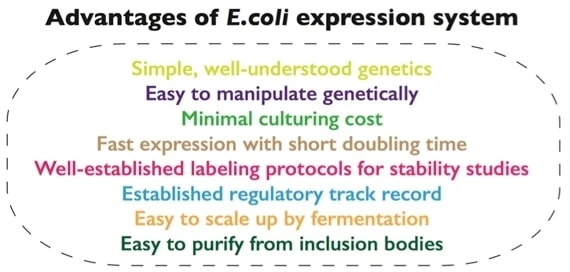Insect Cell-Baculovirus
Insect cell baculovirus expression system uses insect baculovirus as the foreign gene carrier, and insects and insect cells as the receptor expression system. Insect cells and mammalian cells have similar translation and post-translational protein modification modes and capabilities, including glycosylation, phosphorylation, acylation, signal peptide excision, and peptide cleavage and decomposition, etc., resulting in recombinant protein antigenicity and immunogen The biological activities such as sex and function are similar to those of natural proteins; it can accommodate inserts of large molecules; it is easy to realize large-scale low-cost production. This system is increasingly being valued and widely used.
Advantage:
High expression level (especially intracellular proteins), faster growth rate, effective cell folding, moderate scalability, extensive post-translational modification, glycosylation is similar to mammalian cells, relatively easy to enzymatically remove Glycosylation (favorable for protein structure determination), no endotoxin.
Disadvantage:
The culture medium is expensive (the cost of the culture medium has been reduced, and various serum-free medium is widely used), a large amount of virus is required, the secretion pathway of the pro-peptide is inefficient, glycosylation is still different from mammalian cells, and virus infection Can cause cell lysis and potentially degradation of expressed protein.
Mammalian Cell
The expression of foreign recombinant protein in mammalian cells can use plasmid transfection and viral vector infection. Using plasmid transfection to obtain stable transfected cells takes several weeks or even months, while the use of viral expression systems can quickly infect cells and integrate foreign genes into viral vectors within a few days. It is especially suitable for large-scale expression. The target protein was detected in the product. Mammalian cell expression vectors must contain control elements such as prokaryotic sequences, promoters, enhancers, selectable marker genes, terminator and polynucleotide signals.
According to the temporal and spatial differences in the expression of the target protein, the expression system can be divided into transient, stable and inducible expression systems. The transient expression system means that the host cell is cultured without selection after the expression vector is introduced. The vector DNA is gradually lost as the cell divides, and the expression time of the target protein is short. The transient expression system has the advantages of simplicity and short experimental period. The stable expression system means that the vector enters the host cell and is selected and cultured, the vector DNA is stably present in the cell, and the expression of the target protein is durable and stable. Due to the need for resistance selection and even pressure amplification and other steps, stable expression is relatively time-consuming and labor-intensive. Induced expression system means that the transcription of the target gene can be opened after being induced by foreign small molecules. The use of heterologous promoters, enhancers and amplifiable genetic markers can increase protein yield.
The host cells commonly used in mammalian cell expression systems include CHO, COS, BHK, SP2/0, NIH/3T3, etc. Different host cells have different effects on protein expression levels and protein glycosylation, so when choosing host cells It should be determined according to the specific situation.
Advantage:
- Protein activity: The exogenous protein produced by mammalian cells after translation and processing modification is far better than prokaryotic expression systems and eukaryotic expression systems such as yeast and insect cells in terms of activity, and is closer to natural proteins. Mammalian cell expression vectors include prokaryotic sequences, promoters, enhancers, selectable marker genes, terminator and polynucleotide signals.
- The biggest advantage of expressing foreign proteins in mammalian cells is the correct high-level structure (such as glycosylation).
- The mammalian expression system has unique advantages in protein initiation signal, processing, secretion, and glycosylation, and is suitable for expressing complete macromolecular proteins.
Disadvantage:
The cost of the culture medium is extremely high, the culture period is long, at least one month or more, the culture is difficult, and the expression level is low.
The composition is complicated, the operation technique is high, the expression output is not large, the yield is low, and sometimes it can cause virus infection.
Animal and Plant Reactor
Animal and plant bioreactors are genetic engineering methods that use common animals or crops as “biological factories” to produce high economic value-added medical proteins, industrial and agricultural enzymes, special carbohydrates, and biochemicals through large-scale cultivation and planting. Degradation of plastics, lipids, and other secondary metabolites and other biological agents.
Animals and plants can express proteins from animals, bacteria, viruses, and plants themselves, which are easy for large-scale cultivation and production, and have special advantages in gene expression and modification and safety. Therefore, the use of animals and plants to produce exogenous proteins has shown extreme Attractive prospects.
Outlook
In the next period of time, the improvement of biotechnology drugs, new products, new dosage forms, etc. will also be promising. More and more functional proteins with large molecular weight and complex structure will be developed into biotechnology drugs; therapeutic antibodies will become the second innovation climax in the field of biopharmaceuticals; in order to improve drug performance, restructuring, fusion proteinization, and in vitro Chemical modification will receive more and more attention; biosimilars will be standardized and developed on a large scale. With the development of technology, there will be more and more recombinant protein expression systems, and the technology will become more and more mature.
Contact Us:
Email : marketing@medicilon.com
Tel : +44 1223 981 792(Europe)
+82 (0)70-8269-5849(South Korea)
08044216898(Japan)
+86 021 58591500(China )
Website: https://www.medicilon.com



